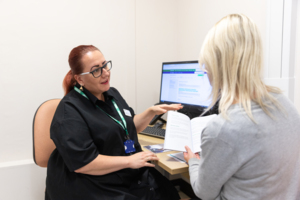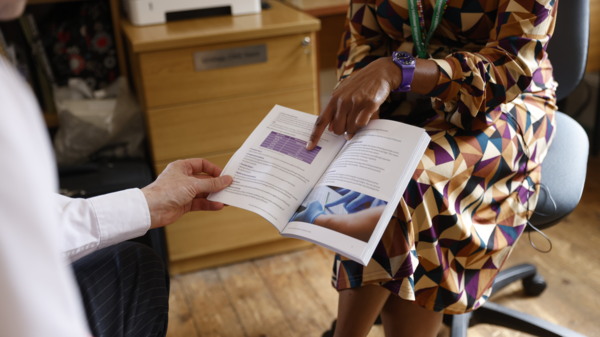
Improving cancer care and inclusivity for the LGBTQ+ community
The ASCO conference, which takes place during Pride Month in Chicago, this year highlighted the challenges faced by the LGBTQ+ community in accessing culturally competent cancer care. Dr Richard Simcock reflects on why healthcare must be inclusive to ensure equity for all patients.
A time to focus and reflect
June was Pride Month and an opportunity to celebrate equality and raise awareness of issues affecting the LGBTQ+ community. For those of us working in cancer care, it’s an opportunity to focus our efforts and reflect on the work that still needs to be done.
It is a coincidence that the biggest cancer conference in the world, ASCO (American Society of Clinical Oncology), is also in June. The conference is hosted in Chicago, a city that had its first Pride Parade in 1970, just a year after the famous Stonewall riots in New York. Alongside the latest blockbuster announcements on cancer breakthroughs at ASCO this year, there was a welcome focus on LGBTQ+ people living with cancer.
The focus was clearly necessary, as researchers presented unsettling data on the difficulties LGBTQ+ people had in getting healthcare providers to recognise their symptoms, to use appropriate language and to attend fully to holistic needs. Stories of trans patients being mis-gendered, gay wives assumed to be ‘your sister’ and total ignorance of sexual recovery were sadly still too common. A heart-breaking example is to be found in the documentary film Southern Comfort, the story of trans man Robert Ead’s delayed diagnosis and death from ovarian cancer and the terrible prejudice he met along the way.
Improving inclusivity in your setting
You may not struggle to find areas for improvement in your own departments to prevent the exclusion of LGBTQ+ people. For example, does your departmental information use gendered pronouns? Information on breast cancer does not need to refer to ‘women’ with the disease but can more inclusively be changed to ‘person’. This simple change would have been inclusive for the men and trans men I have treated with the disease.
ASCO had already issued a White Paper in 2017 identifying 5 pillars of improved LGBTQ+ care. These were; to develop appropriate patient education and support, to develop workforce diversity and to bring in quality improvement, research, and policy strategies.
A product of the five pillars was the presentation at this year’s ASCO of the results of the COLORS trial, a US-based training for HCPs in issues faced by LGBTQ+ people with cancer. Despite the fact that the HCPs taking part in the study already showed high levels of awareness of many EDI issues, the short online training package still improved awareness and attitudes. A message that even those who know a lot about sexual and gender minority issues can always usefully learn more. It will be more difficult to measure if this training improves care and outcomes in the longer term, but it is an important step.
These North American efforts are being matched in the UK. It’s now a year since the Joint Collegiate Council for Oncology (a joint group of Royal Colleges and the Association of Cancer Physicians) produced a statement of similar intent to the ASCO White Paper but in an expanded 10-point plan. One stated aim was to provide ‘local training in cultural competency and humility.'
In line with COLORS, two UK based Oncologists (Alison Berner and Dan Saunders) produced a 1-hour online training package for ESMO, which is well worth your time if you have ESMO membership. Need for the training was demonstrated in a 2020 survey of UK Oncologists, which showed that while the majority were comfortable treating LGBTQ+ patients, many would fail to identify these patients in their clinic and meet their needs.
The key message from June this year is that we can do more to help, simply by educating ourselves, to the benefit of all LGBTQ+ people with cancer. Have a great Pride 2022!
Access training and webinars
For more information and support, it might be worth taking some time to look at the new inequalities in cancer care for LGBTQ+ communities topic available on the Macmillan Learning and Communications Hub. New dates for our LGBTQ+ webinar series will also be launching soon.
You can sign up to our professional newsletters to stay up to date with the latest clinical updates for your role.
Stories And Media
-
Blogs 14 Jun 2024This blog is an opportunity to demonstrate Macmillan’s engagement with research particularly in terms of listening to the experiences of patients and staff and making healthcare improvements.
-
Blogs 11 Apr 2024Dr Hannah Tharmalingam, National Clinical Advisor for Macmillan, discusses what's new in prostate cancer screening and the potential impact on diagnostic testing for prostate cancer.
-
Blogs 03 Apr 2024Lead Medical Advisor Dr Anthony Cunliffe and colleagues from the Centre of Clinical Expertise reflect on their experiences of the Oncology Professional Care Conference.






